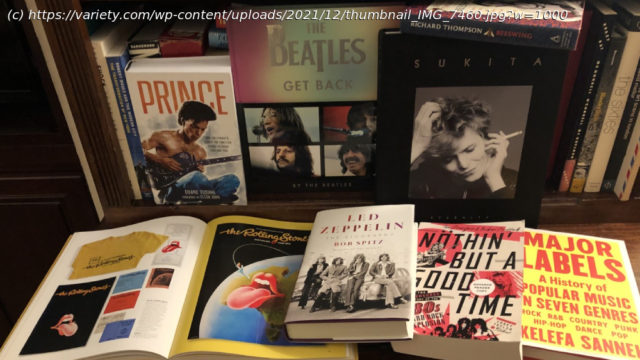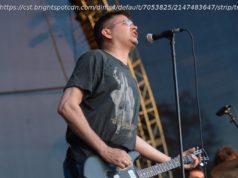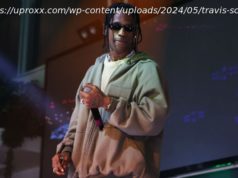From the Beatles and Prince to hair metal and female jazz drummers, here’s a heaping stack of the best music books of 2021.
So many music books, so little time. As always, we did our best to keep up with the bounty of music tomes that have hit the shelves in the past year, and as always, we failed dismally — but we did read quite a few! Below are our summations of the best ones that we actually managed to finish, with no offense intended toward those we didn’t. “The Beatles — Get Back” by the Beatles; John Harris (editor) — When the book component of the Beatles’ “Let It Be” memorial year came out in hardback in October, full of transcribed dialogue from the original 1969 recordings, Variety wrote: “It’s remarkable how much of ‘Get Back’ reads like it could be adaptable into an off-Broadway play.” Of course, we did soon all get to see many of these fertile exchanges enacted, and not just reenacted, in Peter Jackson’s multi-part documentary. It’s no discredit to Jackson’s fine work, though, to say that some of these scenes play out even better on the page than they do on screen; things mumbled offhand on-camera can suddenly loom as much more momentous, or hilarious, in cold print. It’s also worth noting that there is by no means complete overlap between the dialogue in Jackson’s series and in the book. The filmmaker and book editor John Harris both had access to the same piles of transcripts and footage, but made some different choices from there, without checking each other’s work. In any case, if “Get Back” as a film left you wanting more, there are outtakes of the outtakes to be found in bound form. God help us, Beatlemaniacs, each and every one: Even with eight hours of viewing under our collective belts, we can’t stop going back. — Chris Willman “Broken Horses: A Memoir” by Brandi Carlile — There’s plenty of evidence in Carlile’s memoir of her being a high-minded (or Highwoman-minded) soul — taking up charitable efforts for refugees and other human rights work; supporting other women in music, both the newcomers and not-so-newbies; providing a public template for what gay marriage and parenting can look like to a populace that’s still adjusting to these things. But over emphasizing her role-model qualities might risk undercutting what a candid, fun and sometimes irreverent read “Broken Horses” is. Carlile is as full of play in her prose as it seems she was in her childhood. If Huck Finn could be a young, gay, faintly redneck girl growing up in Washington state, that’d be Carlile as she describes here, and that sense of wonder and delight is never too far away even when she’s having some heavier reckonings with homophobia or the vagaries of show business. As good a rock autobiography as we’ve had since her hero Elton John’s “Me,” Carlile’s memoir is, from page to page, a healing balm or a good malt liquor. — Chris Willman “Beeswing: Losing My Way and Finding My Voice 1967-1975” by Richard Thompson with Scott Timberg — Thompson is indisputably one of the greatest songwriters and guitarists to emerge in the past 50 years, and this autography — which wisely focuses on the first decade of his career — shows just how much he and his legendary first band, Fairport Convention pioneered the fusion of rock and English folk and were at the epicenter of the exhilarating London music scene of the mid-late ‘60s. While there’s no shortage of triumph (the group’s many classic albums and concerts) and tragedy (the 1969 tour-bus crash that killed original drummer Martin Lamble and deeply scarred the band), Thompson’s measured, very British tone actually underplays his fascinating story. — Jem Aswad “Crying in H Mart: A Memoir” by Michelle Zauner — Despite her parents’ role as occasional muse to her lyrics as frontperson of the band Japanese Breakfast, Zauner’s autobiographical tale of growing up as a young Korean-American is separate from, but obviously related to, her music. She’s more plainspoken and free as an author than as a songwriter; blunt but also buoyant. With that, her intimate memoir is unbound and unblinkingly fearless – yet dramatically structured – in recalling the emotion of her mother’s death and the manner in which a young Zauner forged her identity as an artist and as a woman. The most telling and humorously heartfelt parts of her story come when writing about her time at her grandmother’s home in Seoul, where Zauner and her mother bonded over traditions of food and family. Here, her life and aesthetic come together, connecting her to every aspect of being Korean, with heritage shrouding “Crying in H Mart” like a warm blanket. — A.D. Amorosi “Decoding Despacito: An Oral History of Latin Music” by Leila Cobo Don’t be fooled into thinking Cobo’s historical volume is just about “Despacito,” the record-smashing 2019 single sensation by Luis Fonsi, Daddy Yankee (and Justin Bieber). Billboard‘s veteran VP of Latin Music uses that track’s mega-crossover appeal to draw a line from contemporary Latin pop’s start to the present, while touching on the politics of being Puerto Rican, Spanish, Cuban, Brazilian, and beyond in America. Certainly, legacy artists and ground-breakers such as Ray Barretto, Willie Colón and Ceila Cruz are present, as is the manner in which salsa pulled itself up from the barrios of New York City and became the foundation of the influential Fania label. But Cobo’s book also offers slices of life and detailed portraits in rhythm and nuance: ‘60s heroes such as Carlos Santana and José Feliciano (whose sophisticated folk is appropriately recognized here), the mainstreaming of Latin pop in the ‘80s-into-‘90s with the Estefans and the Iglesiases, modern day salseros such as Marc Anthony, and present-day heroes such as J Balvin and Rosalía all make an appearance — and Cobo even brings in lesser-known heroes such as merengue master Elvis Crespo in for good measure. — A.D. Amorosi “Eternity” by Sukita — Now 83, veteran photographer Masayoshi Sukita begins “Eternity” by addressing the pandemic, writing “With my creativity curtailed under the current circumstances, my consciousness turns to the past” — which is a suitable introduction to this coffee-table book collecting some of his most iconic work from across a remarkable career.






